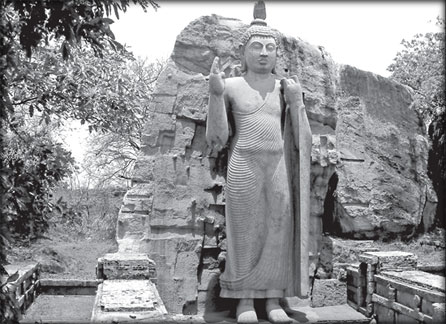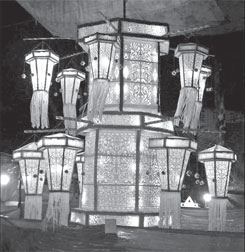As you sow the seed, so shall you reap the fruit
By Lionel Wijesiri
Vesak, which falls in a few days’ time, is the most sacred day for
Theravada Buddhists throughout the world. It is a major Uposatha day to
be marked by re-dedication to the Buddha, Dhamma and the Eightfold Path.
Today, it may be opportune for us to explore the concept of one of the
Buddha’s central teachings - the doctrine of kamma (karma - action).
Kamma is based on the principle of the law of cause and effect and is
the natural law of morality, which asserts that an intentional action
will lead to a result proportionate in nature and intensity to that
intention.
 |
|
The Buddha statue at
Aukana |
Kammically productive actions are those which are based on skilful or
unskilful volition. The Pali word for skilful is kusala, which is
variously translated as wholesome, good, meritorious, virtuous and
intelligent.
The Pali word for unskilful is akusala, translated as unwholesome,
evil, bad, deleterious, non-virtuous and unintelligent. A skilful action
produces a result which is desirable, good and happy, while an unskilful
deed brings about just the opposite. As the Buddha has eloquently
declared: “As you sow the seed, so shall you reap the fruit.”
Kamma means an action, never its result. The Pali words for the
result are phala, vipaka or kammavipaka. It is important to be aware of
this distinction to avoid misunderstandings about kamma.
Skilful intention
Skilful or unskilful intention constitutes the motivation underlying
the performance of an action. When there is an intention to perform
Kamma, there arises volitional energy that provides a moving force for
the action, whether wholesome or unwholesome, depending on the kind of
volition at the moment. This action may be expressed through any of the
three channels of body, speech, and mind.
In fact, it is intention that conditions man’s action and constitutes
the basis for all mental formations. Ask yourself, What is the cause of
the inequality that exists among mankind? Why should one person be
brought up in the lap of luxury, endowed with fine mental, moral and
physical qualities, and another in absolute poverty, steeped in misery?
Why should one person be a mental genius, and another an idiot? Why
should one person be born with saintly characteristics and another with
criminal tendencies? Why should some be linguistic, artistic,
mathematically inclined or musical from the very cradle? Why should some
be innately blind, deaf or deformed?
According to Buddhism, this inequality is due not only to heredity,
environment and nature, but to Kamma. In other words, it is the result
of our own past actions and our own present doings. We ourselves are
responsible for our own happiness and misery. We are the architects of
our own fate.
Fruition
Once the Buddha said: “Bhikkhus, there are those who say ‘Whatever
Kamma is made by this man, he will receive identical results thereof.’
If such were the case, there could be no higher life, no path could be
perceived for the successful ending of suffering.
“But with the view, ‘When Kamma based on a certain kind of feeling is
made (pleasant or unpleasant, for example), results arise in conformity
with that feeling,’ the higher life can be, there is a way for the
ending of suffering.
“Bhikkhus, for some people, only a little bad Kamma can lead to
rebirth in hell, but for others that same small amount of bad Kamma will
produce results only in the present moment, and even then, only the most
extreme aspects of it will become apparent, not the minor.
“What kind of person is it who, for only a little bad Kamma, goes to
hell? There are those who have not trained their actions, have not
trained in moral restraint, have not trained their minds and have not
developed wisdom. They are of little worth, are of small status and
dwell discontented over minor Kamma results. This kind of person it is
who, over just a little bad Kamma, can go to hell (like putting a lump
of salt into a very small vessel).
 |
|
Vesak lanterns during
the week |
“What kind of person is it who, for exactly the same amount of bad
Kamma, receives fruit only in the present, and even then, the minor
aspects of that Kamma do not manifest, only the major? There are those
who have trained their actions, have trained in moral restraint, have
trained their minds and have developed wisdom. They are not of little
worth, they are great beings, they have a measureless abiding. For this
kind of person, just the same kind of minor bad kamma gives results only
in the present, and even then the minor aspects of that Kamma do not
manifest, only the major (like putting a lump of salt into a river).” -
Anguttara-nikaya
Ownership
When we do good deeds, such as giving charity, if we hope for good
results, this will affect the result of our action. The Visuddhimagga
says: “A deed undertaken out of desire for fame is low. One undertaken
with desire for the fruits of merit is moderate. One undertaken with the
clear understanding that it is the custom of the Noble Ones is
superior.” So it is vital to cultivate insight to purify the mind of
ulterior motives, otherwise even our good deeds will tend to prolong
suffering in the cycle of existences, not to speak of bad deeds.”
The Buddha said that beings are the owners of their Kamma
(Kammassaka), heirs of their Kamma (Kammadayada), have Kamma as their
origin (Kammayoni), are related to their Kamma (kammabandhu), and have
kamma as their refuge (Kammappatisarana); whatever skilful or unskilful
action they do, they will inherit its results.
In this life, we are said to be the owners of our properties, and we
will go to extraordinary lengths to protect them. We say, think, and
believe firmly, “This is my watch, my car, my house, my wife, my
children, my own body.” However, we can’t take any of these things with
us when we die. Everything must be left behind - except for Kamma.
Whatever good and bad actions we have done throughout life follow us to
give results in due course, just like a shadow that never leaves. That
is why the Buddha said that beings are the owners of their Kammas.
Good Kamma
The potential of Kamma is not destroyed at death, but we cannot point
out where it is stored. A tree has the potential to give fruits in due
season, but we cannot point out where the fruits are stored in a tree.
Even though a tree is capable of giving fruit, if the weather is not
right, no fruits will appear. It is similar with Kamma. Only powerful
Kamma will give a definite result, the result of a lesser Kamma is not
definite. If this were not so, there could be no escape from suffering.
Some Kamma give results in the same life, others will give their
results in the next life. The remainder give results in the lives after
that, so everyone has a store of good and bad Kamma that is waiting for
the right season to bear fruit. In this life too, everyone is doing many
good and bad Kamma. Powerful good Kamma can prevent bad Kamma from
giving their result, or mitigate their effects.
Likewise, powerful bad Kamma can prevent good Kamma from giving their
result, or spoil their effects. The Buddha illustrated this with an
example. If you put a spoonful of salt in a cup of water it becomes
undrinkable, but if you put a spoonful of salt in a lake, you cannot
even taste it.
So we should do as much good Kamma as we can, we should not do any
more bad Kamma at all, and we should cultivate knowledge, wisdom, and
awareness so that we know the difference and can control our emotions.
|


